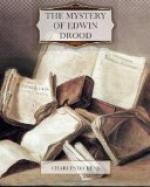Many accounts and account-books, many files of correspondence, and several strong boxes, garnished Mr. Grewgious’s room. They can scarcely be represented as having lumbered it, so conscientious and precise was their orderly arrangement. The apprehension of dying suddenly, and leaving one fact or one figure with any incompleteness or obscurity attaching to it, would have stretched Mr. Grewgious stone-dead any day. The largest fidelity to a trust was the life-blood of the man. There are sorts of life-blood that course more quickly, more gaily, more attractively; but there is no better sort in circulation.
There was no luxury in his room. Even its comforts were limited to its being dry and warm, and having a snug though faded fireside. What may be called its private life was confined to the hearth, and all easy-chair, and an old-fashioned occasional round table that was brought out upon the rug after business hours, from a corner where it elsewise remained turned up like a shining mahogany shield. Behind it, when standing thus on the defensive, was a closet, usually containing something good to drink. An outer room was the clerk’s room; Mr. Grewgious’s sleeping-room was across the common stair; and he held some not empty cellarage at the bottom of the common stair. Three hundred days in the year, at least, he crossed over to the hotel in Furnival’s Inn for his dinner, and after dinner crossed back again, to make the most of these simplicities until it should become broad business day once more, with P. J. T., date seventeen-forty-seven.
As Mr. Grewgious sat and wrote by his fire that afternoon, so did the clerk of Mr. Grewgious sit and write by his fire. A pale, puffy-faced, dark-haired person of thirty, with big dark eyes that wholly wanted lustre, and a dissatisfied doughy complexion, that seemed to ask to be sent to the baker’s, this attendant was a mysterious being, possessed of some strange power over Mr. Grewgious. As though he had been called into existence, like a fabulous Familiar, by a magic spell which had failed when required to dismiss him, he stuck tight to Mr. Grewgious’s stool, although Mr. Grewgious’s comfort and convenience would manifestly have been advanced by dispossessing him. A gloomy person with tangled locks, and a general air of having been reared under the shadow of that baleful tree of Java which has given shelter to more lies than the whole botanical kingdom, Mr. Grewgious, nevertheless, treated him with unaccountable consideration.
‘Now, Bazzard,’ said Mr. Grewgious, on the entrance of his clerk: looking up from his papers as he arranged them for the night: ‘what is in the wind besides fog?’
‘Mr. Drood,’ said Bazzard.
‘What of him?’
‘Has called,’ said Bazzard.
‘You might have shown him in.’
‘I am doing it,’ said Bazzard.
The visitor came in accordingly.
‘Dear me!’ said Mr. Grewgious, looking round his pair of office candles. ’I thought you had called and merely left your name and gone. How do you do, Mr. Edwin? Dear me, you’re choking!’




